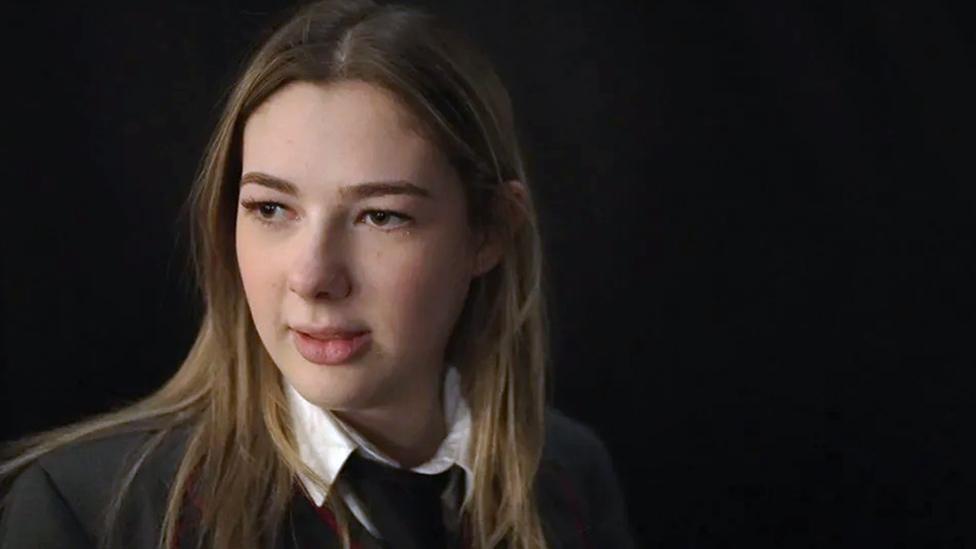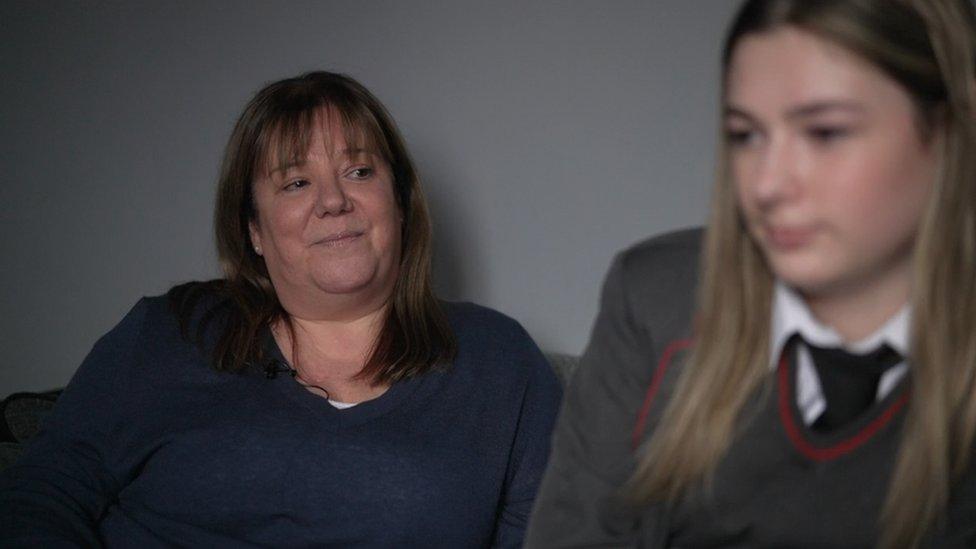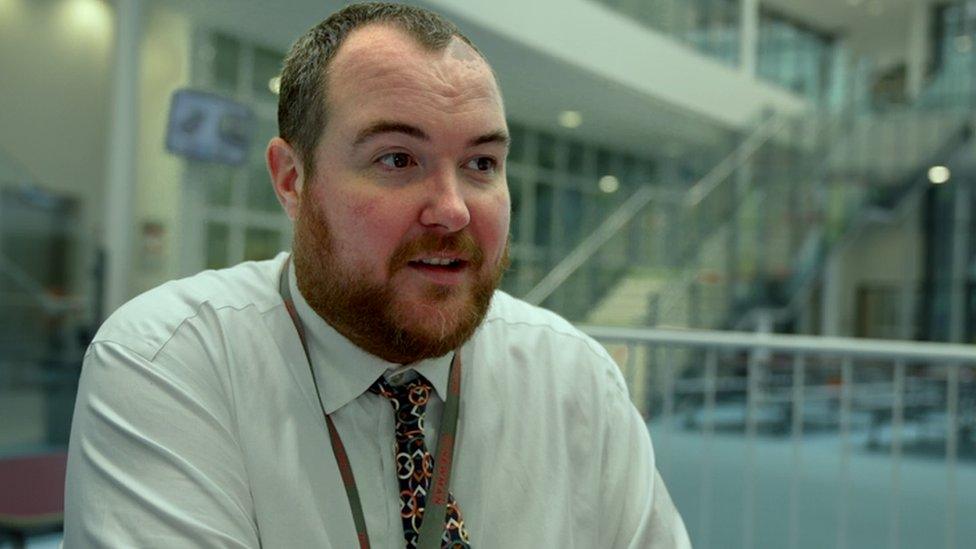'I get overwhelmed by the noises and crowds of school'
- Published

Erin was at primary school when the pandemic started
The disruption and isolation of lockdown had a particularly profound impact on children with special needs, many of who did not receive the support they required. Some schools are now struggling to help pupils who find it difficult to cope.
Lockdown turned out to be very bad news for 14-year-old Erin, from Oldham.
She was in the last year of primary school at the time of the first lockdown. The experience affected her confidence massively.
"Before Covid, I'd never imagined feeling uncomfortable doing anything, I was always the first one to say 'I'll do that', now I don't dare do anything."
At the time Erin enjoyed being confined to one class, feeling like it was a safe space.
But when education returned to normal, she struggled at her new school, Newman Roman Catholic College. "I get really overwhelmed with all the noises and the crowds. I cannot deal with crowds - it really stresses me out."
Erin had already been diagnosed with dyslexia and dyspraxia, but an assessment for autism was put on hold during the pandemic.
"It delayed diagnosis, we missed the opportunity to get additional support and that has had a big impact on her," says her mum, Cheryl.
Before Covid, 16 children at the school were on Education, Health and Care (EHCP) plans which set out additional support given by the local authority for special educational needs. Now the figure is 53.

Cheryl (l) with Erin
In addition there are 176 children like Erin who need extra learning support but do not qualify for an EHCP, so the school must fund them out of its existing budget.
For those with an EHCP, the first £7,000 comes from the school budget before the local authority can offer more.
Across England 353,995 EHCPs were issued in 2019, but in 2023, after the pandemic, the number had risen to 517,000. The number of pupils with SEN support without an EHC Plan now stands at 1,183,384.
Erin fell behind at school, and started to get into trouble. She regularly walked out of class, and then refused to return.
"I was quite a nightmare, I was out of control. One of my mates literally had to sit and do my work in my lessons because I wouldn't do it," she says.
Cheryl said she would get frantic phone calls and text messages from Erin, often from the school toilet, asking for her to come and take her home. "It was hard. It was really hard, I felt like a failure as a parent," she says.
Staff say the school has worked hard to address the problems of Erin and the other pupils with special needs. There is a safe space - called The Link - where pupils can spend their breaks and lunchtimes away from crowds.
Erin is in smaller classes - known as nurture groups - for most lessons, and staff established a pass system to allow her to leave school and take a break when things got too much.
Erin has also had sessions with the local Children and Adolescent Mental Health Services (CAMHS) to improve her behaviour and self-esteem that has made a "massive, massive difference".
But despite this Erin has only managed to be in school for a couple of days a week for the last few years.
"If I walk in the room and there is a test I'm walking back out of it, I can't do it. I need a week to prepare myself."
Pupils like Erin, who go to school in the most-deprived areas - more than a third of pupils at Newman qualify for free school means - are much more likely to be persistently absent than those who attended schools in the least-deprived areas. A third have missed at least 10% of sessions so far this academic year.
Hungry and anxious
Rebecca Ashworth, who plays a leading role in Newman's safeguarding, has to deal with hungry children who ask for food, and severe incidents of self-harm which result in a trip to A&E.
She says her job is "more stressful" than her old position in front-line social work.
"There is so much more put on schools post-Covid. We have definitely seen an increase in mental health concerns and safeguarding concerns across the board," she says.
She said the support services to which pupils are referred are also incredibly stretched. Although the school has an NHS CAMHS mental health practitioner who sees five children one day a week, they can only deal with pupils who pose a low-level risk.
With 1,500 children in the school, Rebecca says there is no way that needs can be fully met, and across Oldham 409 children are waiting for a neuro-development assessment.
Maggie Holland, who works at the school providing mental health support, says problems with pupils' self-esteem have never been worse. Since Covid she has drop-ins at breaktime and lunchtime, and staff do morning "meets and greets" with pupils with social anxiety who do not attend school to try to persuade them to return.
She says family breakdown during Covid have exacerbated problems for children who found themselves in the middle of conflict. She also noticed that children's eating habits had changed during lockdown, with some either bingeing or not eating at all.
Clear behaviour guidelines
Maths specialist Sam Gray, Newman's head of behaviour, says the school had "the worst behaviour we've ever seen when we got back after Covid". However, it has worked hard on how best to deal with students, tightening up the existing systems and responses to behaviour.
For instance, being late to lessons is an automatic detention, but new rewards have also been introduced, including celebrating a Newman hero every week.

The school's head of behaviour, Sam Gray
Staff have undergone a lot of retraining too, but there is only so much they can do.
"We can't educate 1,500 to the level we want whilst dealing with a huge amount of personal and societal crisis," he says.
"It's like we're just burying our heads and keeping going without ever taking a step back and thinking society has changed [post-Covid] and how are we going to change with that.
"There's a lack of trust from parents of anyone in power and I do think that comes from Covid.
"We've got really good relationships with our parents, we're building that up again, but that's taking time, that's taken three years."
Head teacher Glyn Potts says the forced pause on normal school life during Covid should have presented an opportunity to create a better system fit for the future - but it was not taken.
"We tinkered around the edge and tried to recreate what we had before moving forward, and that was such a missed opportunity.
"And now more schools are operating within that framework when the world has changed.
"We're dealing with issues and expected to do more when the resources and the infrastructure are not there - yet we're still finding a way of making it work."
A Department for Education spokesperson said schools should have sensitive conversations with families and work closely with them to put in place support for children with special educational needs.
"Thanks to our fantastic teachers and school leaders, and our package of wide-ranging reforms designed to support schools to improve attendance, 440,000 fewer children were persistently absent or not attending last year," they said.
Listen to more on this story on 5 Minutes On on BBC Sounds.